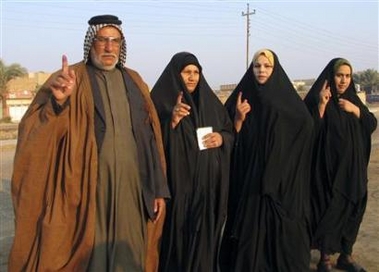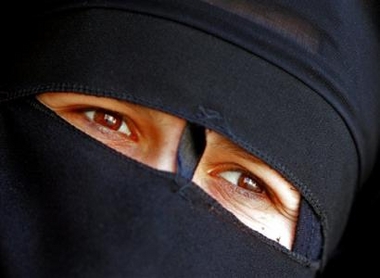|
Millions of Iraqis vote in relative peace
(AP)
Updated: 2005-12-16 08:31 Many Shiite politicians have little interest in concessions to Sunnis on
their key demands, including a greater share of power and allowing a role for
Saddam loyalists in public life.
As a result, negotiations to create a new government �� including a prime
minister �� could drag on for weeks just as they did following January's
election, when many Sunnis stayed away from the polls because of threats of
violence or to honor boycott calls. Another prolonged political struggle might
worsen sectarian tensions.
Still, Iraqi leaders expressed relief that the election had passed relatively
smoothly.

Iraqi residents show their stained fingers
after voting during Iraq's historical parliamentary elections in the Iraqi
city of Diwaniya, 180km (112 miles) south of Baghdad, December 15, 2005.
[Reuters] | "The time has come to build Iraq with
our own hands and to use the great wealth that God has granted to Iraq to
rebuild Iraq so that we can turn our poverty into wealth and our misery into
happiness," Prime Minister Ibrahim al-Jaafari said.
U.S. officials saw the lack of violence as an encouraging sign.
"We should expect the insurgency not to just go away, but to gradually
reduce," said Gen. George Casey, top U.S. commander in Iraq, speaking via video
to a town hall-style meeting of Defense Department workers at the Pentagon.
Defense Secretary Donald H. Rumsfeld added, "This election constitutes a
defeat for the enemies of the Iraqi people, the enemies of the legitimate Iraqi
government. It constitutes a defeat to the people who have been doing the
beheadings and conducting the suicide raids."
As polls opened, a mortar shell exploded near Baghdad's heavily fortified
Green Zone, slightly wounding two civilians and a U.S. Marine, the U.S. military
said.
In northern Iraq, a civilian was killed when a mortar shell hit near a
polling station in Tal Afar, and a grenade killed a school guard near a voting
site in Mosul.
Turnout was most striking in Sunni Arab areas, including the Baghdad district
of Azamiyah. Last January, few voters turned out in Azamiyah, where Saddam took
refuge when Baghdad fell.
Tareg Moustafa Abdullah, 70, said he regretted boycotting the January
election, which allowed Shiites and Kurds to win control. "We ended up with
people who do not know God," he said.

An Iraqi woman waits to vote at a polling
station in the Iraqi town of Fallujah Thursday Dec. 15,
2005.[AP] | In Fallujah, the former Sunni insurgent bastion seized by U.S. forces in
November 2004, 11 of the city's 35 polling stations did not receive ballot
boxes, while some sites ran out of ballots in the morning, said Mayor Dhari
al-Arsan.
He said some voters "thought it was done purposely," but he attributed the
lack of ballot boxes to the large turnout. "Today we are witnessing the biggest
democratic process," al-Arsan said.
Election commission spokesman Farid Ayar said officials opened only 167 of
the planned 207 election centers in Anbar province because of security. Anbar
includes Ramadi and Fallujah.
Turnout was also reported high across the Shiite south, including Basra,
where the director of one polling center, Amjad Mahdi, estimated more than 70
percent of the 5,000 registered voters at his facility had cast ballots.
With a nationwide vehicle ban in effect, most Iraqis walked to the polls.
Streets were generally empty of cars, except for police, ambulances and a few
others with permits.
Ethnic tensions arose in Kirkuk, a northern city claimed by Arabs, Kurds and
Turkomen. Norjan Adel, a poll watcher for the Turkoman Front, complained of
irregularities by the Kurds, including multiple voting.
|